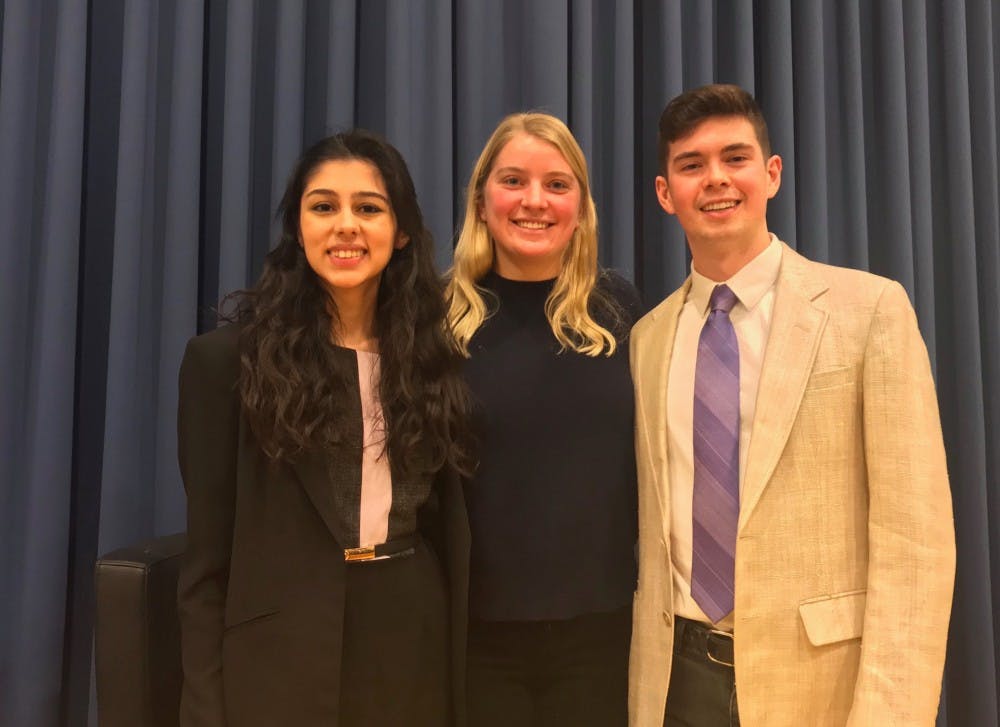Fifteen people, including Undergraduate Student Government (USG) officers, showed up to the Presidential Candidate Debate on Nov. 29.
With elections taking place early next week, three presidential candidates presented their platforms and discussed topics such as mental health, Career Services, USG accountability, national politics, and minority groups’ concerns.
The three candidates, Electra Frelinghuysen ’20, Nate Lambert ’20, and Zarnab Virk ’20, have varying levels of past USG experience. Lambert is the 2018–19 USG vice president and served as a senator his first year. Virk has worked on the Projects Board, USG’s “funding arm.” She has also worked with campus administrators as a part of the Princeton Student Events Committee. Frelinghuysen has no USG experience.
In his opening statement, Lambert explained that his top-priority issues include combating sexual misconduct, decreasing feelings of isolation and loneliness on campus, and working to secure funds for free menstrual products on campus.
On the other hand, Frelinghuysen aims to strengthen Career Services, facilitate relationships between students and professors, and improve the first-year advising system and class selection.
She explained that Career Services should improve the existing services geared towards careers outside of finance and consulting. She also aims to make its website easier to navigate.
Virk focused on increasing inclusivity on campus, especially among students who are not in eating clubs. She also plans to address issues relating to transportation, student-run cafes, tech repair labs, and alumni relations.
Since Virk is a member of a minority group, had previously been in an eating club for a semester, and is now in a co-op, she felt that she represents different minority groups, whose concerns are not typically addressed.

She hopes to increase communication between minority groups and USG.
“It’s really important that these groups know how to … obtain funding for events that they want to host on campus,” Virk said.
She also hopes to improve resources for first-generation, low-income students by connecting incoming first-years with upperclass mentors.
Adding on to Virk’s concerns about minorities, Frelinghuysen explained that there is no one-size-fits-all solution to issues involving minorities, but she hopes to host forums with those who are concerned.

On the issue of national politics, all candidates agreed that USG should remain non-partisan.
Lambert pointed out past examples where USG provided a platform for activism and civic engagement of all political leanings. He hopes to continue with a similar policy.
Though all three candidates consider their campaign promises feasible, they expect criticism and to be held accountable if anything falls through.
Virk expressed a desire to create a timeline with her election promises and update the student body regularly on her progress.
Lambert pointed out the importance of being candid with the student body, specifically during times of pushback from the administration.
While the candidates agreed on several issues, their opinions split when it came to discussing on-campus transportation. Virk proposed initiating a business partnership between the University and Uber or Lyft in order to help low-income students travel to inexpensive grocery stores.
Lambert disagreed with this proposal. He explained that USG does not traditionally opt to partner with private companies because the process is both lengthy and questionable.
“It’s a bit risky to have your public government organization represented with a private company,” said Lambert, pointing to USG’s refusal to formally endorse College Pulse earlier this year.
Lambert said that Virk’s goals could be achieved by making the Saturday Shopper more accessible and adding more affordable stops to the service’s route.
However, Virk argued that the Saturday Shopper hours are problematic and that a partnership with Uber or Lyft would be more convenient for students. She added that Johns Hopkins University already partners with Lyft.
The first-year advising process was another central issue.
Frelinghuysen recalled how “overwhelming” course selection was during Orientation.
She suggested connecting incoming first-years with upperclass student advisors over the summer to ease the transition to the University.
She explained that encouraging unpaid faculty advisors to be excited about assisting first-years is difficult. Instead, more emphasis should be placed on the relationship between students and their Peer Academic Advisers.
The debate ended with a Q&A from the audience and questions that were submitted online prior to the debate.
“Two of you are going to lose, so what are you going to do when you lose?” asked one audience member. “Are you going to stay involved in USG?”
Frelinghuysen expressed a desire to run for one of the policy-oriented positions in the spring if she does not win the election.
She added that in order to produce change, she does not necessarily need to be in a leadership role. Just by campaigning, she already feels more involved in the community.
Similarly, Virk hopes to stay involved in USG, no matter the election results. If she loses, she hopes to rejoin a USG board, likely the Student Life Committee.
Lambert, on the other hand, does not expect to stay involved in USG if he does not win. Instead, he would more likely become involved in other campus organizations, such as student newspapers and arts-related groups.
USG and the American Whig-Cliosophic Society hosted the USG Presidential Candidate Debate at 7 p.m. in the Whig Hall Senate Chamber. Former USG Vice President Dan Qian ’19 moderated the debate.
Online voting will take place from noon on Monday, Dec. 3, to noon on Wednesday, Dec. 5. Most positions, including USG Vice President, are unopposed. However, there are three candidates running for Social Chair, three candidates running for two Class of 2021 Senator positions, and 15 candidates for two Class of 2022 Senator positions.








